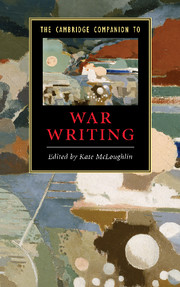Book contents
- Frontmatter
- Introduction
- Part I Themes
- Part II Influences
- Part III Poetics
- 8 Medieval warfare
- 9 Early modern war writing and the British Civil Wars
- 10 The eighteenth century and the romantics on war
- 11 American Revolutionary War writing
- 12 The Victorians and war
- 13 The American Civil War
- 14 The First World War: British writing
- 15 The First World War: American writing
- 16 The Spanish Civil War
- 17 The Second World War: British writing
- 18 The Second World War: American writing
- 19 American writing of the wars in Korea and Vietnam
- 20 The Cold War and the “war on terror”
- Index
20 - The Cold War and the “war on terror”
from Part III - Poetics
Published online by Cambridge University Press: 28 January 2010
- Frontmatter
- Introduction
- Part I Themes
- Part II Influences
- Part III Poetics
- 8 Medieval warfare
- 9 Early modern war writing and the British Civil Wars
- 10 The eighteenth century and the romantics on war
- 11 American Revolutionary War writing
- 12 The Victorians and war
- 13 The American Civil War
- 14 The First World War: British writing
- 15 The First World War: American writing
- 16 The Spanish Civil War
- 17 The Second World War: British writing
- 18 The Second World War: American writing
- 19 American writing of the wars in Korea and Vietnam
- 20 The Cold War and the “war on terror”
- Index
Summary
Desktop secrets
At the climax of John le Carré's Absolute Friends (2004), the finest fictional evocation of the deep genealogical links between the Cold War and the ongoing “war on terror,” the novel's hero, Ted Mundy, is discovered alone on the premises of his bankrupt language school in Heidelberg. Mundy, a former British Council employee who has drifted into intelligence jobs organized by his “absolute friend,” Sasha, a Stasi double agent, sets about cracking open boxes of what he supposes is a consignment of countercultural textbooks sent to him by a mysterious benefactor, Dimitri, for the purpose of establishing a “Counter-University” in the ancient German city. He is disconcerted instead to discover handbooks of terrorism techniques, reams of inflammatory literature, and further within, rows of hand grenades and what he assumes are timers for home-made bombs. His bewilderment is interrupted by the chatter of automatic gunfire, and the view, as he peers from his window, of Sasha's slain body in the courtyard. Moments later, as Mundy attempts an inexpert escape, clinging to a window ledge, he too is torn apart by heavy caliber bullets fired by a “masked languid” counterterrorist officer. Within a matter of moments, what will come to be known as the Siege of Heidelberg is over.
- Type
- Chapter
- Information
- The Cambridge Companion to War Writing , pp. 239 - 249Publisher: Cambridge University PressPrint publication year: 2009



